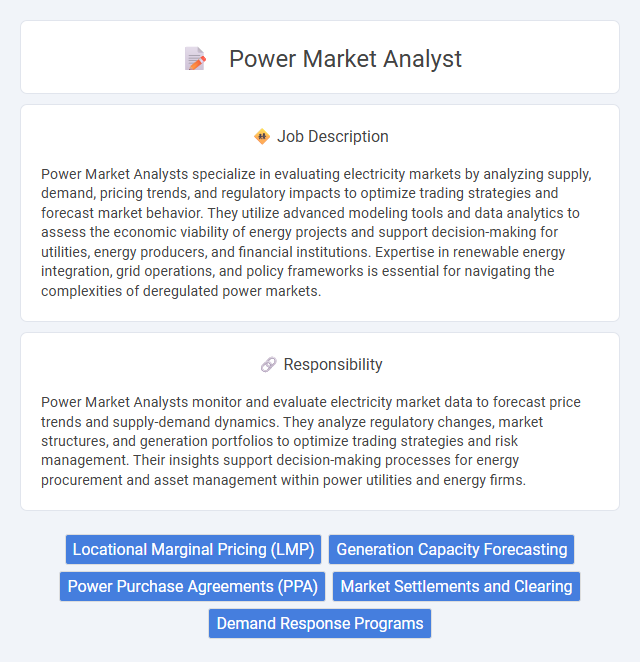
Power Market Analysts specialize in evaluating electricity markets by analyzing supply, demand, pricing trends, and regulatory impacts to optimize trading strategies and forecast market behavior. They utilize advanced modeling tools and data analytics to assess the economic viability of energy projects and support decision-making for utilities, energy producers, and financial institutions. Expertise in renewable energy integration, grid operations, and policy frameworks is essential for navigating the complexities of deregulated power markets.
Individuals with strong analytical skills and a keen interest in energy markets are likely to thrive as Power Market Analysts. Those comfortable working with complex data sets and interpreting market trends may find this role suitable for their strengths. Candidates who enjoy problem-solving and staying updated on regulatory changes are probably well-matched to the demands of this position.
Qualification
A Power Market Analyst requires strong analytical skills with expertise in energy market trends, regulatory frameworks, and forecasting techniques. Proficiency in data analysis software such as Python, Excel, and specialized energy trading platforms is essential. A background in economics, engineering, or energy management combined with experience in power market modeling and risk assessment enhances job performance.
Responsibility
Power Market Analysts monitor and evaluate electricity market data to forecast price trends and supply-demand dynamics. They analyze regulatory changes, market structures, and generation portfolios to optimize trading strategies and risk management. Their insights support decision-making processes for energy procurement and asset management within power utilities and energy firms.
Benefit
Power Market Analysts likely enjoy benefits such as competitive salaries and opportunities for career advancement within the energy sector. Access to cutting-edge market data and the potential to influence energy policy and trading strategies may enhance job satisfaction. Flexible working arrangements and professional development programs could also be common perks in this role.
Challenge
Power Market Analysts likely face complex challenges due to the volatile nature of energy markets and the increasing integration of renewable energy sources. Deciphering fluctuating market trends and regulatory changes probably requires advanced analytical skills and adaptability. Navigating these uncertainties may demand constant updating of predictive models to support informed decision-making.
Career Advancement
Power Market Analysts play a crucial role in evaluating electricity markets, interpreting regulatory policies, and forecasting price trends to optimize energy trading strategies. Mastery in data analytics, market modeling, and regulatory frameworks enables progression to senior roles such as Energy Market Strategist or Risk Manager. Continuous specialization in renewable energy markets and advanced risk assessment techniques significantly accelerates career advancement within the power industry sector.
Key Terms
Locational Marginal Pricing (LMP)
A Power Market Analyst specializing in Locational Marginal Pricing (LMP) evaluates electricity prices at specific grid locations, reflecting the cost of delivering additional power considering supply, demand, and transmission constraints. They analyze market data, grid congestion, and generation costs to optimize bidding strategies and forecast price fluctuations. Proficiency in energy market software and regulatory frameworks enables informed decision-making in competitive wholesale electricity markets.
Generation Capacity Forecasting
Power Market Analysts specializing in Generation Capacity Forecasting utilize advanced data modeling techniques and industry trends to predict future electricity supply capabilities. They analyze factors such as fuel availability, plant performance, regulatory impacts, and market demand to ensure accurate capacity projections. These forecasts support utility companies and grid operators in optimizing resource allocation and maintaining grid reliability.
Power Purchase Agreements (PPA)
Power Market Analysts specializing in Power Purchase Agreements (PPA) evaluate contract structures, pricing models, and market trends to optimize energy procurement strategies. They analyze regulatory frameworks and forecast electricity demand to support negotiation and risk assessment in PPAs. Their expertise ensures cost-effective agreements that align with renewable energy targets and regulatory compliance.
Market Settlements and Clearing
Power Market Analysts specializing in Market Settlements and Clearing manage the financial transactions and risk assessments in wholesale electricity markets, ensuring accurate billing and compliance with regulatory standards. They analyze settlement reports, reconcile discrepancies between market participants, and optimize clearing processes to maintain market stability and liquidity. Proficiency in market rules, tariff structures, and real-time data analytics is critical for evaluating price signals and supporting effective energy trading decisions.
Demand Response Programs
Power Market Analysts specializing in Demand Response Programs evaluate electricity consumption patterns to optimize grid stability and reduce peak demand costs. They analyze market signals and customer behavior to design strategies that incentivize reduced energy usage during high-demand periods, supporting energy efficiency and cost savings. Their insights directly contribute to enhancing demand flexibility and balancing supply with fluctuating renewable energy sources.
 kuljobs.com
kuljobs.com